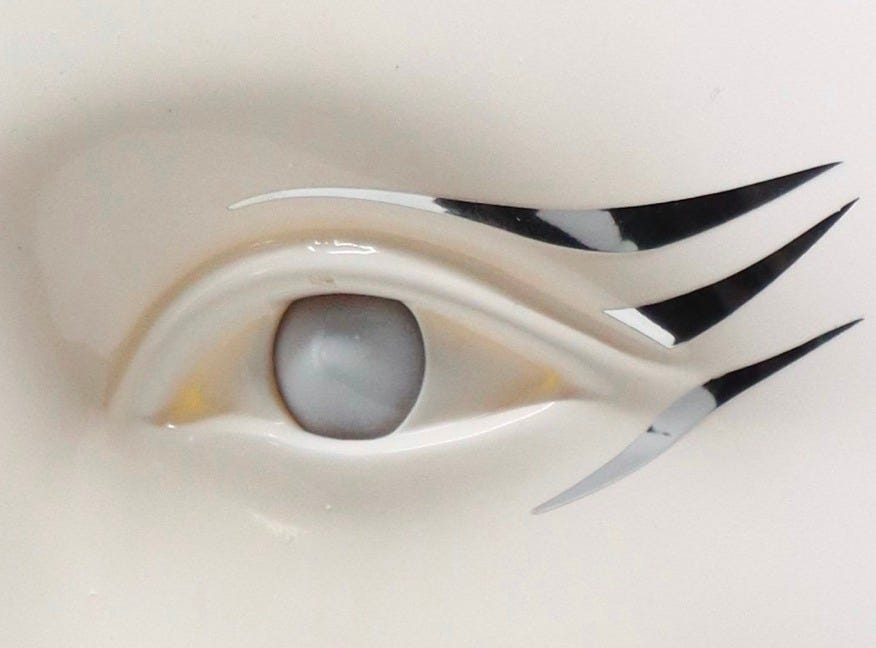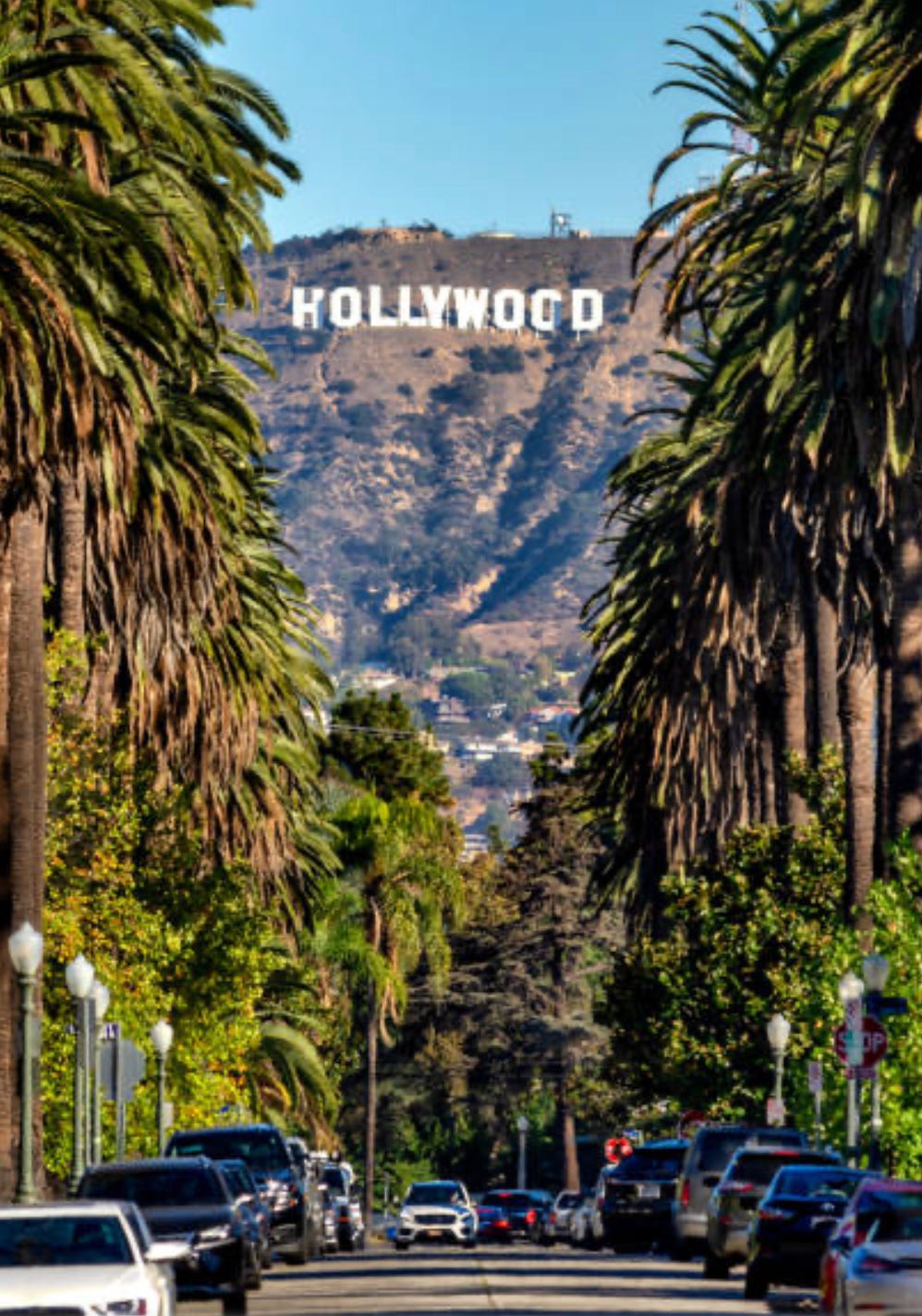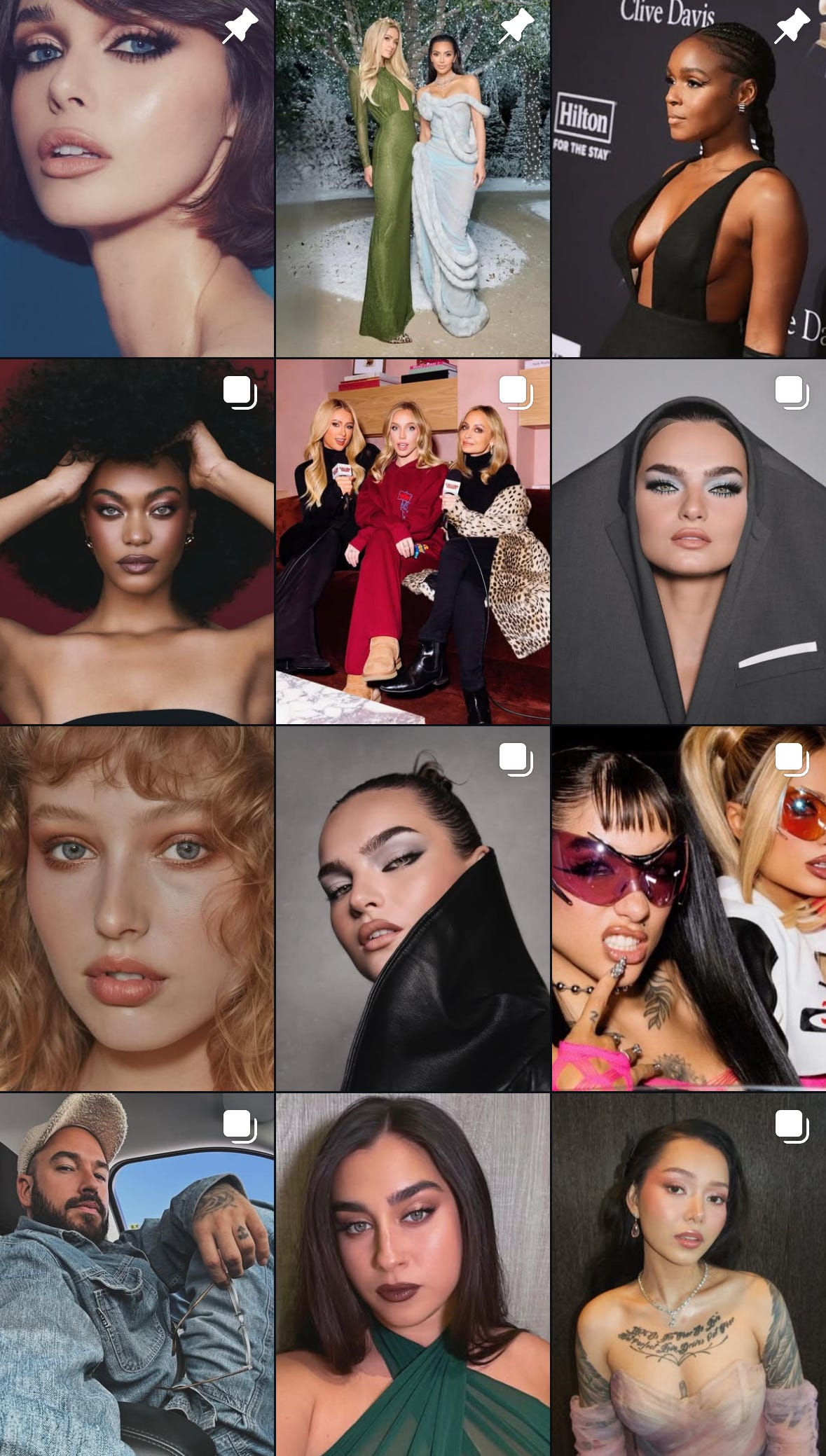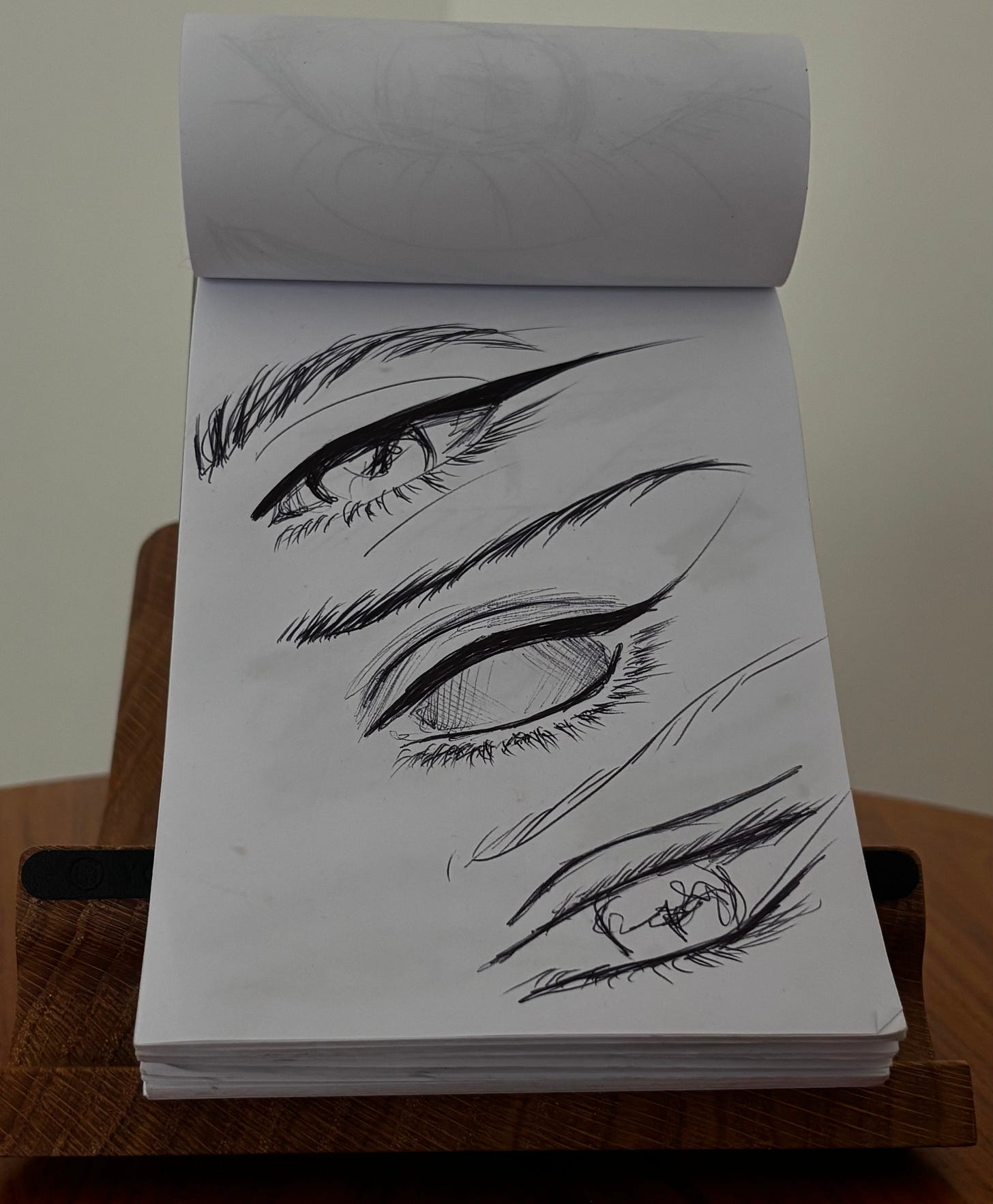This morning, I find myself at the retro-chic Beachwood Café, tucked near the Hollywood Hills, a stone away from the iconic Hollywood sign. The café hums with a laid-back California vibe—perfectly fitting for the guest across from me. Vittorio, my middle son, 41 years young, sits casually sipping an oat milk latte. As for me, I’m savouring a cappuccino that impressively holds its own against those served in Italian bars.
Vittorio, a makeup artist who relocated from Canada to Los Angeles 11 years ago, graciously agreed to sit down and share his journey. From the snowy streets of Montreal, to the busy life of Toronto and finally to the sun-drenched avenues of Venice Beach, his story is one of bold decisions, creative growth, and a few bumps along the way.
When did you move to Los Angeles?
Vittorio: I moved to LA in 2014, after spending about three years working in the U.S. while still based in Canada.
What brought you here?
Vittorio: It started with a job—a three-month contract for a reality show on ABC. I was working with Kesha, who I’d already been touring with. The show, “Rising Star”, was based in LA, so I moved my home base from Toronto to Venice Beach... and I’ve stayed ever since.
How did that transition go?
Vittorio: It wasn’t without drama. Back in 2011, I got detained at the Toronto airport for not having the proper work visa. That ordeal was costly. I scrambled to get everything sorted—a work visa expedited in just a week and a half, but at a cost of $10,000. I didn’t have the money, so I made a deal to work for a few months on tour in exchange for it. By then, I had already left my home in Toronto, so turning back wasn’t an option. I jumped in headfirst.
When did your love for makeup artistry begin?
Vittorio: It feels like it’s always been there. I was four or five when I started playing with makeup from Mom’s drawers. There’s even a photo of me putting makeup on her at that age. She owned a salon so growing up I was surrounded by beauty magazines, hair rollers, and creativity. By college, I was doing makeup on friends—even during lectures. When I finally got my own makeup kit, I could stop sneaking products from Mom!
How do you balance creativity with the business side of your work?
Vittorio: Honestly, I don’t think I’ve mastered that balance. That’s why I have an agent. They handle the business side—contracts, logistics—so I can focus on the artistry. Of course, they take 20%, but it’s worth it to keep my creative energy intact.
Tell us about working with Kesha.
Vittorio: Working with Kesha remains one of my career highlights. We had such compatible personalities, and it was a harmonious collaboration. Both of us were exploring our voices at the time, so it was a safe, playful space to experiment with bold looks. It was healthy for both of us creatively.
What was life on tour like?
Vittorio: Touring was a crash course in everything—skills, stamina, and adaptability. My first tour with Kesha in 2011 was a North American bus tour, and I had no idea what to expect. I learned through trial and error. Over the years, I honed my techniques—waterproof, sweat-proof, everything-proof. But after a while, the excitement faded. I started craving stability: a home, a partner, maybe even a pet.
What was a typical tour day like?
Vittorio: A typical day on tour, you would wake up, maybe 11 or noon from your bunk on the bus, unload all your stuff into the arena or the venue, grab something to eat and then in my case I would start the preparation. So, if there was things to clean and sanitize in my kit; if there was hair to prepare and wash and curl, all that stuff would be done and then by the time Hair and Makeup would start it would be the evening. We would do the show in the evening and then pack up get back onto the bus wake up in another City or when we were in Europe wake up in another country.
Any other celebrities you can mention
Vittorio: Some of the other celebrities I work with are Janelle Monáe, Paris Hilton, Keke Palmer, Lauren Jereguime, MIA, Shay Mitchell, Demi Lovato, Bella Poarch, Ava Max, and many more.
Any memorable projects or collaborations?
Vittorio: Project that I’ve worked on outside of painting celebrity faces are partnerships with beauty brands like Anastasia, Beverly Hills, Ilia, Charlotte Tilbury, Chanel, Tom Ford. Those are all brands that I’ve had the luck to be able to work with, but also it’s worth mentioning I created my own brand at the beginning of the pandemic that still is going strong today. The brand is my name Vittorio Masecchia Beauty (VMB) and it’s a line of luxury Decals. They’re basically wearable doodles you can see on Beyoncé, the Kardashians, Ariana Grande, Camilla Cabelo, Kim Petras, lil nas x, Lizzo, Xtina, and a bunch of queens from drag race.
Before LA, what was life like in Toronto?
Vittorio: Toronto was my home for 10 years. I studied makeup at Complections International and quickly made a name for myself, even winning Canadian Makeup Artist of the Year. That led to signing with my favorite agency and a whirlwind of opportunities my younger self could only dream of.
How do you remember your early days in Toronto?
Vittorio: It was a mix of excitement and fear. I loved the freedom of my own apartment and making new friends, but I was also spending a lot of time alone. It was a crash course in independence—and in perfecting my craft.
Do you miss Montreal?
Vittorio: "I can’t say I miss Montreal in the sense that I’d want to move back, but I do miss the feeling of being younger, more energetic, and a little more open to life. When I think of Montreal, I remember a version of myself that was less responsible, less jaded, and a lot more hopeful about humanity. I’m definitely more disillusioned with people now in my 40s."
What do you like most about LA? And least?
Vittorio: The thing I love most about LA is the nature—it’s everywhere you look. Wildflowers, palm trees, succulents, cacti—it’s always sunny, and I’ve always been obsessed with driving, so this city feels like home.
But there’s a flip side. I can’t stand the flakiness of people here. Relationships often feel superficial, driven by celebrity culture, and the fires are a constant reminder of how fragile it all is.
Would you live anywhere else in the world?
Vittorio: Absolutely. I think I’d probably settle somewhere in Europe. I’d even consider moving back to Canada. Right now, I’m open to living in countries outside the U.S., especially one with healthcare—let’s be honest!
Today marks Trump’s inauguration for his second term in office. You emigrated during Obama’s presidency, lived through Trump’s first term, and Biden’s as well. Have you noticed any changes in living conditions over the years?
Vittorio: It’s sad to see politics intruding on personal lives, especially when it comes to queer history, science, and medicine. I don’t think people need to personally subscribe to gender variations to avoid causing harm.
Take intersex people, for example—they exist. Whether a president acknowledges it or not doesn’t change that reality. Their feelings don’t outweigh objective truth. You’re born intersex? You’re valid. Your existence isn’t up for debate.
Socially and politically, the country has changed a lot since I’ve been here. The veneer has worn thin, and the U.S. feels more like a Third World country trying to masquerade as something else. It’s the only developed nation that doesn’t take care of its people. It’s clear that the division here is growing—people are more emboldened to hate, to separate, and to harm others. It’s disheartening, to say the least.
Vittorio's reflections give a raw and unfiltered glimpse into his journey and the worlds he's navigated— We will shift now to a more personal angle of his life.
Do you think being part of the LGBTQ+ community impacts your work? If so, how?
Vittorio: Yeah, it would be hard to separate being a queer person from my artistry and vision of beauty. It’s all woven into the fabric of my soul—there’s no escaping it. Everything I create is through the lens of a queer person, and that lens brings joy and pride to my clients. My artistry is celebrated by the people who hire me, who see and support this part of me. Honestly, I’m not designed to walk through life 'straight forward,' if you know what I mean
What does it mean to you to live authentically in both personal and professional spaces?
Vittorio: Living authentically means showing up and being present. It’s giving the person in front of me my undivided attention, speaking intentionally, and being impeccable with my word. Sometimes, just slowing down and living with integrity can feel like an act of protest.
What differences do you notice in LGBTQ+ communities in LA versus Canada?**
Vittorio: Queer people are fundamentally the same wherever you go, but there are differences in comfort levels depending on rights and acceptance in a given country. When rights are challenged or removed, it shows in how people show up in their community. In Canada, there’s a certain ease—less tension, more freedom.
Are there any misconceptions about the 'gay world' you’d like to address?
Vittorio: The most damaging misconceptions about queer people often come from those without direct connections to the community. A lot of these ideas stem from biased sources, leading to harmful associations like linking queerness with immorality or even worse things like bestiality or pedophilia. These projections are perverse, and they dehumanize us. It’s exhausting and unfair.
How did attending an all-boys Catholic school shape your understanding of your identity at the time?
Vittorio: High school is an interesting memory for me. Those five years were incredibly formative, but not always in a positive way. I think about how much love, passion, and attention I’ve poured into female beauty—and maybe that’s because, during those years, I didn’t have access to it when I wanted it most.
High school was full of cruelty. Boys threw matches at me, shoved gum in my hair, pushed me around. That time shaped the relationship I had with myself—since there weren’t outside options for connection, I turned inward. My first memories of doodling eyeballs, something I still do every day, started back then. Even during exams, my textbooks were filled with drawings. It felt like something inside me was bursting to get out, begging to be set free. That’s where my creativity started, but it also left scars I still carry.
Did you have any supportive teachers, peers, or mentors during those years?
Vittorio: Not really. My high school years, from 1995 to 2000, weren’t exactly a beacon of support. There weren’t any teachers who saw me as someone needing protection or value. My peers? Same story. Back then, value and worth were measured by cishet boys who cared only about sports and dominance. It was isolating.
Looking back, what would you tell your younger self during those years?
Vittorio: For years, I believed that those challenges made me stronger, but now I know that trauma doesn’t always build resilience. Sometimes it creates shame, doubt, fear, and mistrust that hold you back.
I wouldn’t thank my bullies (who I can still name) for what I went through—that’s their karma, not my lesson to learn. Their mistakes and homophobia aren’t something I need to turn into a positive narrative.
If their actions shaped me in any way, it was in turning me into a people pleaser. I thought being agreeable, smiling, and uplifting would make me more likable and worthier of connection. Now, at 41, I’m working on undoing that need for approval.
Do you think society has made progress in accepting LGBTQ+ individuals since your youth?
Vittorio: From the inside of the queer community, it doesn’t feel like much has changed. Growing up in the ’80s and ’90s, I was part of a generation that lost so many mentors to the AIDS crisis—artists, designers, doctors, and scholars. We lost the pillars of our culture.
Society told us we deserved it, and I internalized that growing up. My people are still fighting for basic rights, and honestly, who are we asking for permission? It’s frustrating to even phrase it that way. Sure, there’s been progress, but it’s like stopping to nap after the first mile of a marathon. There’s way more work to be done.
What advice would you give to young LGBTQ+ individuals pursuing creative careers?
Vittorio: Take up more space. Don’t waste time worrying about being likable. You could be the most radiant shade of turquoise, but if someone’s looking for orange, it won’t matter. Focus on kicking ass and disrupting the patriarchy.
Any messages for non-LGBTQ+ allies?
Vittorio: Don’t wait for someone in the queer community to educate you—do the work yourself. And if you can’t do that work yourself, to educate your own self on what it looks like to be an ally, at the very least shut up and get out of the way
Any final words you’d like to share?
Vittorio: Two things:
1. Separate understanding from agreeing.
2. Separate feeling from behavior
Thank you, Vittorio, your words are a powerful and unapologetically honest.
It’s a beautiful day and the smoke in the air has cleared, feel like a walk?
Click forVittorio link to Instagram











What a wonderful interview with your son, such a talent and thankfully he likes himself which is a good thing, I just wish there was another word other than queer, people who choose their sexuality aren’t odd, maybe different, but that’s their choice. How proud you must be of Vittorio. Big hugs all round. 🏳️🌈
Very powerful and thoughtful insights. Great post!